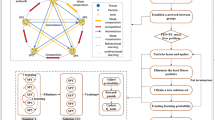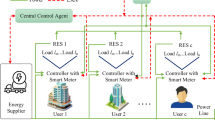Abstract
For improving the energy-saving power generation scheduling in the electric power industry energy saving and emission reduction capability and enhance the safety and economy of power energy structure, we based on neighborhood opportunity learning multi intelligent power quickly swarm intelligent control algorithm is presented in this paper. Firstly, the proposed algorithm is based on the characteristic value of each neighborhood characteristic value which is obtained by chance mining. The system can obtain the real-time sensing data of each neighborhood power station. This algorithm establishes a neighborhood modular architecture. The algorithm in the opportunity to automate the operation of the module information on the opportunity to learn. Secondly, based on the opportunity to learn and fast variation of the power vector, the algorithm is derived to control the power generation fast group. The algorithm of the multiple power generation control system through the opportunity to control and quickly set the mapping link. Finally, the experimental results show that the proposed algorithm has a significant advantage in real-time, reliability and cost of intelligent management and fast control of power generation to adapt to a variety of power generation devices.









Similar content being viewed by others
Explore related subjects
Discover the latest articles and news from researchers in related subjects, suggested using machine learning.References
Costantino N, Serventi R, Tinfena F et al (2011) Design and test of an HV-CMOS intelligent power switch with integrated protections and self-diagnostic for harsh automotive applications. IEEE Trans Ind Electron 58(7):2715–2727
Fu M, Yin H, Liu M et al (2016) Loading and power control for a high-efficiency class E PA driven megahertz WPT system. IEEE Trans Ind Electron 63(11):6867–6876
Gai Y, Krishnamachari B (2014) Distributed stochastic online learning policies for opportunistic spectrum access. IEEE Trans Signal Process 62(23):6184–6193
Graham J, Starzyk JA, Jachyra D (2015) Opportunistic behavior in motivated learning agents. IEEE Trans Neural Netw Learn Syst 26(8):1735–1746
Lee M, Uhm Y, Yong K et al (2009) Intelligent power management device with middleware based living pattern learning for power reduction. IEEE Trans Consum Electron 55(4):2081–2089
Lin S, Salles D, Freitas W et al (2012) An intelligent control strategy for power factor compensation on distorted low voltage power systems. IEEE Trans Smart Grid 3(3):1562–1570
Lin FJ, Tan KH, Fang DY et al (2013) Intelligent controlled three-phase squirrel–cage induction generator system using wavelet fuzzy neural network for wind power. IET Renew Power Gen 7(5):552–564
Logan KP (2007) Intelligent diagnostic requirements of future all-electric ship integrated power system. IEEE Trans Ind Appl 43(1):139–149
Mainali K, Tripathi A, Madhusoodhanan S et al (2015) A transformerless intelligent power substation: a three-phase SST enabled by a 15-kV SiC IGBT. IEEE Power Electron Magn 2(3):31–43
Murphey YL, Park J, Kiliaris L et al (2013) Intelligent hybrid vehicle power control—Part II: online intelligent energy management. IEEE Trans Veh Technol 62(1):69–79
Rouger N, Crebier JC, Catellani S (2008) High-efficiency and fully integrated self-powering technique for intelligent switch-based flyback converters. IEEE Trans Ind Appl 44(3):826–835
Sikkabut S, Mungporn P, Ekkaravarodome C et al (2016) Control of high-energy high-power densities storage devices by Li–ion battery and supercapacitor for fuel cell/photovoltaic hybrid power plant for autonomous system applications. IEEE Trans Ind Appl 52(5):4395–4407
Wang Z, Chen B, Wang J et al (2017) Networked microgrids for self-healing power systems. IEEE Trans Smart Grid 7(1):310–319
Winkler J, Dueñas-Osorio L, Stein R et al (2017) Performance assessment of topologically diverse power systems subjected to hurricane events. Reliab Eng Syst Saf 95(4):323–336
Xu Y, Wang J, Wu Q et al (2012) Opportunistic spectrum access in unknown dynamic environment: a game-theoretic stochastic learning solution. IEEE Trans Wireless Commun 11(4):1380–1391
Xu Y, Wu Q, Shen L et al (2013) Opportunistic spectrum access with spatial reuse: graphical game and uncoupled learning solutions. IEEE Trans Wireless Commun 12(10):4814–4826
Acknowledgements
This work is supported in part by the National Natural Science Foundation of China (51405498) and Natural Science Foundation of Shaanxi Province, China (2013JQ8023).
Author information
Authors and Affiliations
Corresponding author
Ethics declarations
Conflict of interest
The authors declare that there is no conflict of interests regarding the publication of this paper.
Additional information
Publisher’s Note
Springer Nature remains neutral with regard to jurisdictional claims in published maps and institutional affiliations.
Rights and permissions
About this article
Cite this article
Xue, X., Tan, Y. Multi crowd fast power control algorithm based on neighborhood opportunistic learning. J Ambient Intell Human Comput 11, 609–615 (2020). https://doi.org/10.1007/s12652-018-0921-1
Received:
Accepted:
Published:
Issue Date:
DOI: https://doi.org/10.1007/s12652-018-0921-1




